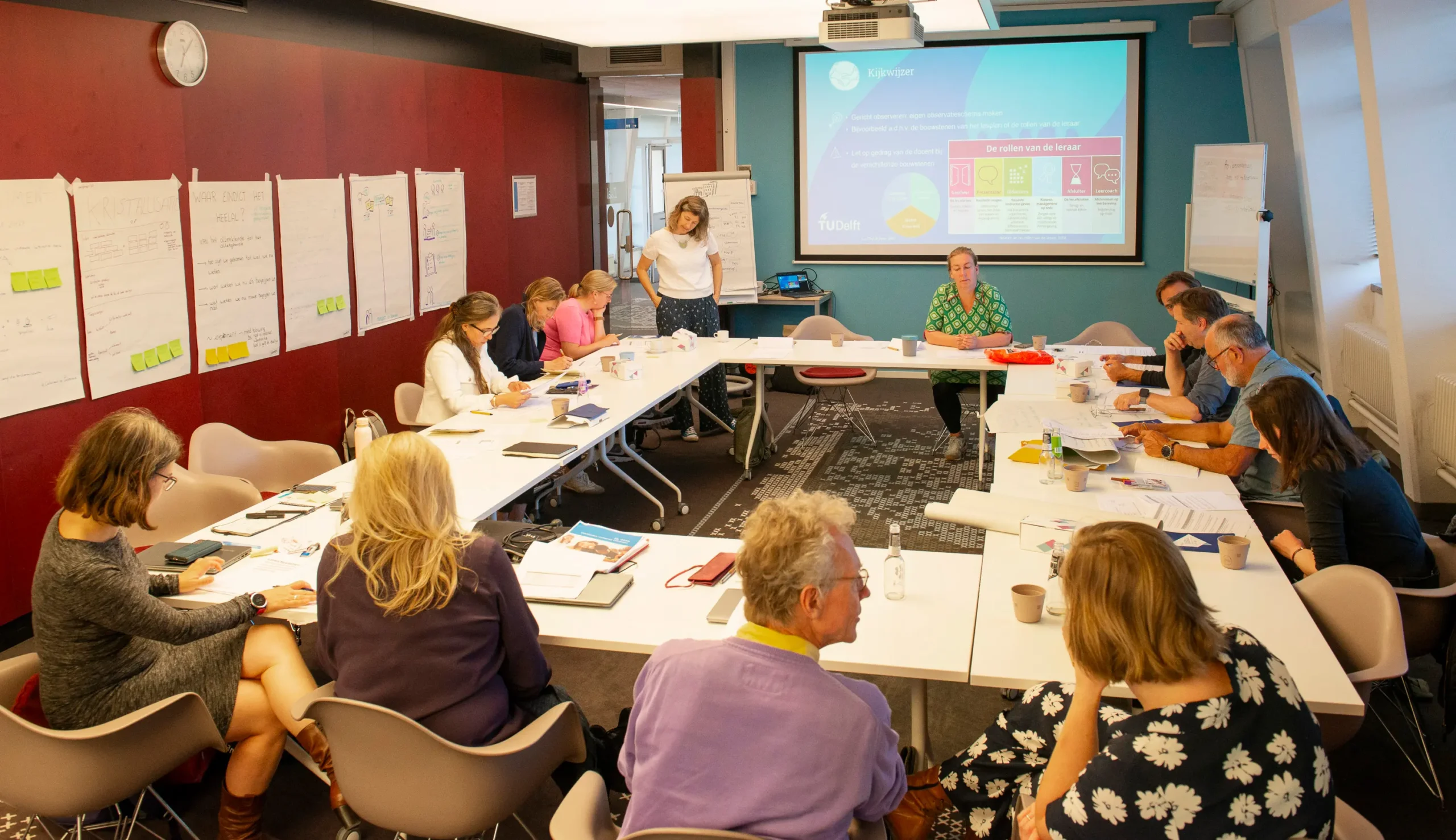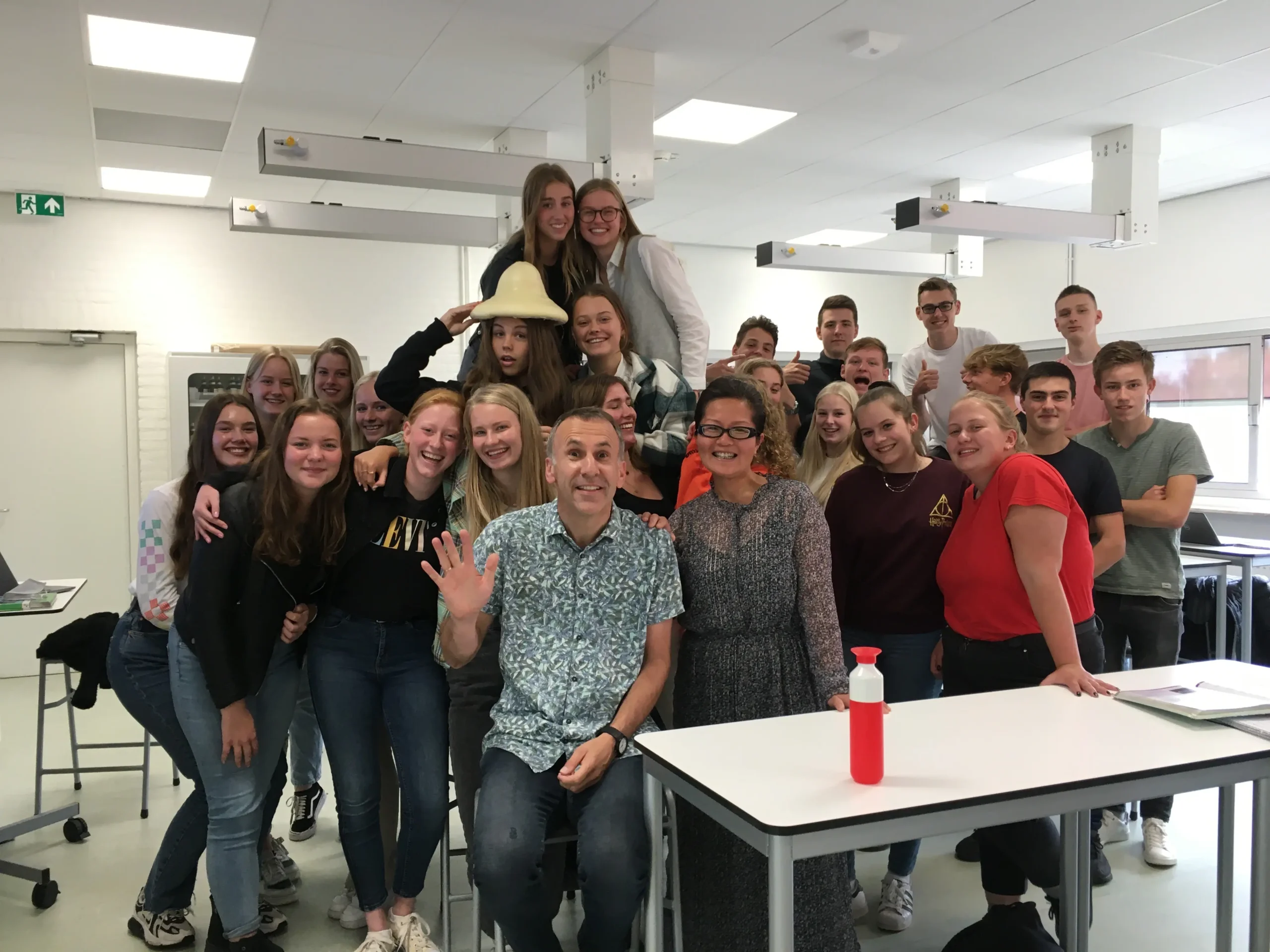“There are alumni who, after having worked in business for years, want a job that serves society,” says Hanno van Keulen, Director of Studies of the TU Delft Teaching Training Programme. “We enable them to retrain to enter the teaching profession.” As an alumnus, you can join the Teacher Training Programme as a lateral entrant for an upper or lower secondary education teaching qualification. The lateral entry track is a two-year programme in which a person obtains a teaching qualification while working in a school. Unlike other students in the Teacher Training Programme, a lateral entrant does not pay tuition fees for the programme.
For several years now, the government has been using subsidies to make it attractive for schools to employ lateral entrants. Teacher training programmes are given a lot of room for customisation, to adapt training at the individual level. “We create a unique programme for each lateral entrant,” says Van Keulen. “People differ in terms of their background and what subject they want to teach, but also in terms of whether they want to work full-time or part-time, or what qualification they want to get.” To make this training as accessible as possible, TU takes all these factors into account. “Later in life, some people want their jobs to have more social significance, while for others the consideration might be that they don’t want to be deployed abroad. For all technically qualified people thinking about a career in education, we offer the opportunity.”
In front of the classroom without having to make a switch
Yet training lateral-entry teachers doesn’t solve the problem by a long shot. “To resolve the shortage of science teachers, we need to produce at least ten times as many teachers. That’s beyond us now,” says Van Keulen. This is why he initiated the Co-Teach STEM pilot project, STEM being the abbreviation for Science, Technology, Engineering & Mathematics. This is a pilot in which alumni and other experts get to support teachers in science subjects as co-teachers, but without having to quit their current job. “These people have a lot of up-to-date knowledge and can give students an idea of what technical professions involve,” says Sinan Al-attar, project leader of the Co-Teach project. To get started as a co-teacher, candidates first follow a six-session module with two school visits spread over several months. “You do this alongside your job,” says Al-attar. “After that, you can choose how you want to assist a teacher: structurally, as a guest lecturer or on a project basis.”
The first Co-Teach STEM module started in September 2023 and the first trainees received their certificates on 29 January of this year. “We are in the next phase now,” says Al-attar. “The schools and co-teachers are enthusiastic. We are currently working hard to make the right matches and recruit new candidates for the September 2024 module.”
Co-teach STEM module
The availability of this module depends on how the pilot project goes and is therefore subject to change.
For more information [email protected]
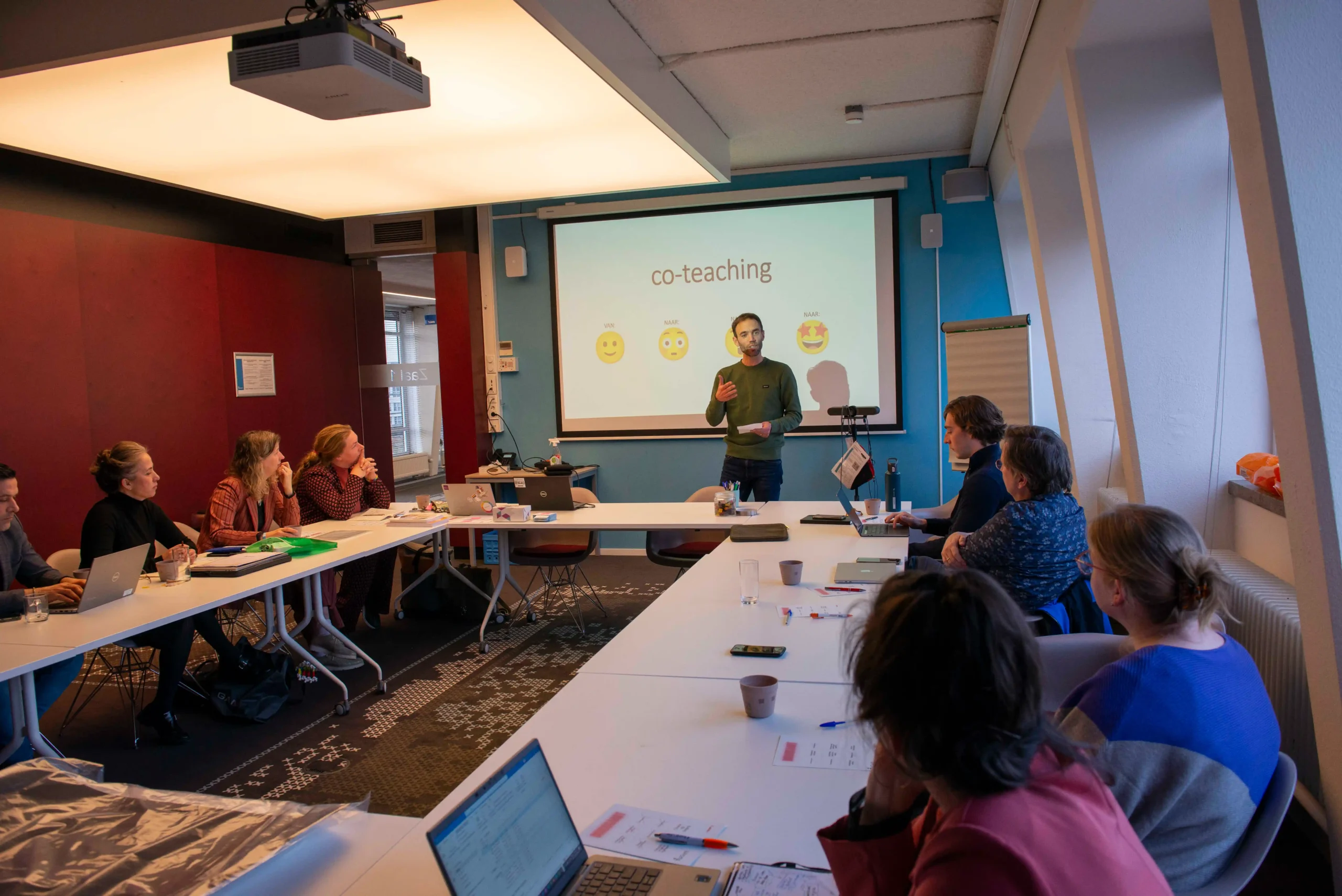
© De Kabelfabriek
Co-teacher
Lars van Rhede van der Kloo
Civil Engineering and Geosciences
Freelance Operations consultant
‘Combining work with teaching feels enriching’
After attending the kick-off of the Co-Teach module, alumnus Lars van Rhede van der Kloot was immediately interested in the programme. He is thinking of starting teacher training in September. The Co-Teach module is the perfect way for him to gain experience at school even before he has his teaching qualification. “Teaching as part of the Co-Teach programme involves a lot of freedom. You can teach without obligation but professionally about something you like, and you can share the knowledge you have of the business world,” says Van Rhede van der Kloot. “But it involved a lot more than I had expected. It’s not something you can do on the side. Istarted working less, which was relatively easy because I am self-employed. It feels like an enrichment that I now manage to combine work and teaching. It makes me happy to be doing it, every time without fail. It is true passion that I experience.”
Lateral-entry teacher
Rong Cai
Chemical technologist
Now teaching chemistry and maths in regular and special education
‘It’s all about the chemistry between me and the student’
Alumnus Rong Cai temporarily stopped working when she returned to the Netherlands after twelve years abroad. “I devoted my time to the children so they could acclimatise,” says Cai. “By chance, I saw a vacancy ad for tutoring. That’s how I discovered that I have a passion for teaching, and that I wanted to be in front of a classroom.” She then obtained her lower-secondary teaching qualification.
Cai enjoyed teaching and within no time she longed for a greater challenge on the content side. She wanted to quality to teach upper secondary school. “Despite the huge teacher shortage we are currently facing, many universities did little to offer me a place,” says Cai. “Things were different at TU Delft. When I asked for information, I received a comprehensive and personalised response back. It was immediately palpable that they like lateral entrants and that you get personal attention during the programme. I noticed this throughout the course, in the care that went into the design of my track and the expertise of the teachers for the courses.” Now Cai works at two schools in regular and special education with students on the autism spectrum. At both schools, she teaches chemistry and mathematics. “Teaching is a lot of fun,” says Cai. “Because I am in special education, there is more time for personal attention. I like that because it’s all about the chemistry between me and the student. Before my switch, I worked in Sales, and my thoughts were about targets all day every day. Now my thoughts are about whether I was able to help a student.”
Junior Lecturer at Mechanical Engineering
Since 2020, it has been possible to join the Mechanical Engineering faculty on a three-year work-learning path where you work in undergraduate teaching at the faculty and get your teaching qualification as a maths or physics teacher at the same time.
The teaching education component is at the TU Delft Teacher Training Programme, and you also do internships at secondary schools. After three years, you then proceed to secondary education, where you are able to teach upper secondary HAVO and VWO. By now, seven Junior Lecturers have obtained their teaching qualifications. Suzanne Onderdelinden was one of the first to go down this route. She studied biomedical engineering at TU Delft and is now a physics teacher at a secondary school. “Junior Lecturer was a new position, so I had no preconceptions. For me, the combination of university and high school was perfect. As a Junior Lecturer, you can narrow the gap between the two.”
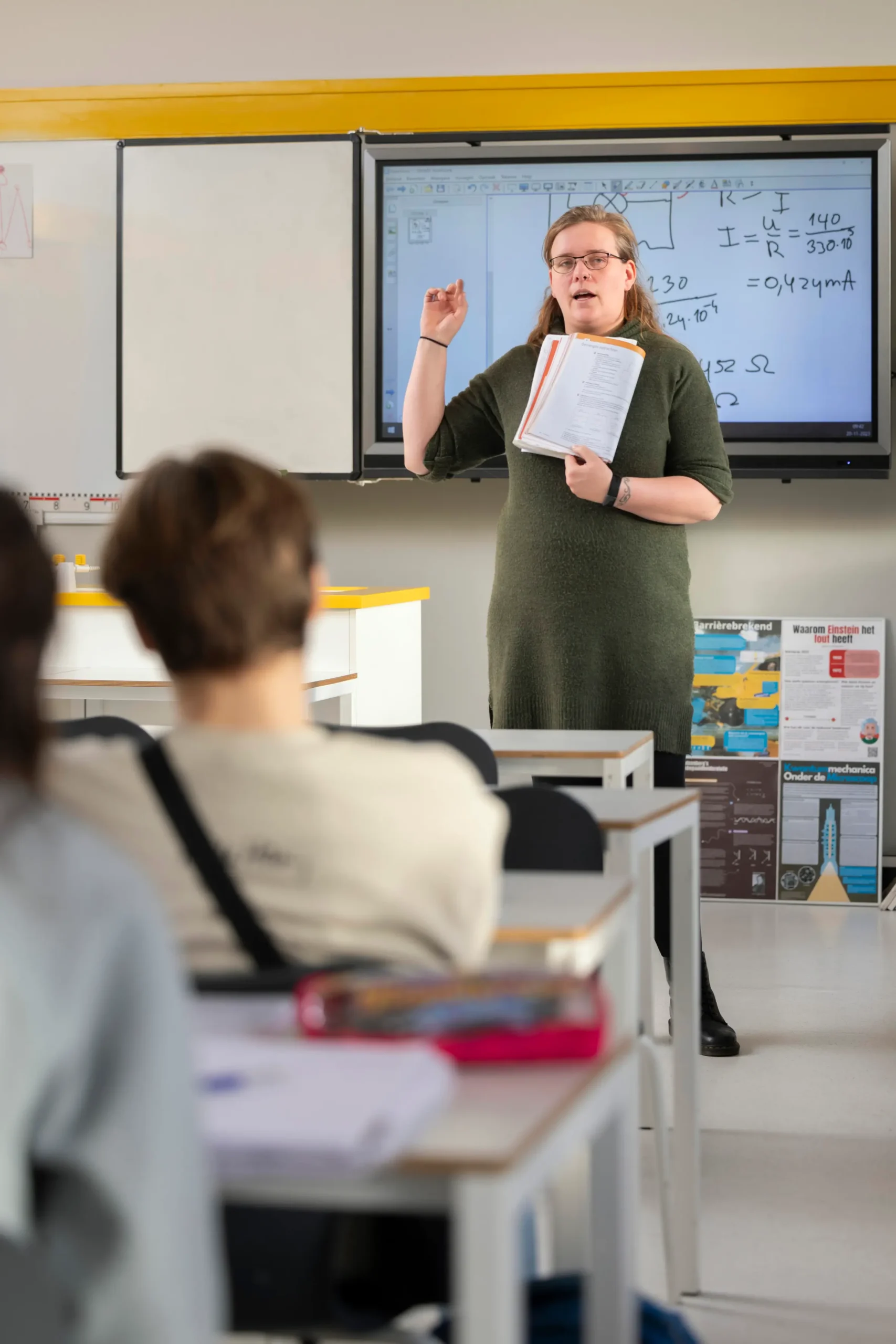
Suzanne Onderdelinden
© Studio Oostrum
Practical
Anna-Louise Nijdam (Master’s degree in marine technology) started the Junior Lectureship in July 2021. “It took some getting used to. In the transition subjects of teacher training, particularly, mathematics is very abstract while in the classroom it’s practical questions that you get a lot of. There’s a lot of fun to be had with the other Junior Lecturers, though. It’s a close-knit group where everyone has a real interest in education.”
Junior lecturer
To apply for a Junior Lecturer vacancy, you must have recently completed your Master’s degree or be graduating soon in mechanical engineering, marine engineering, civil engineering, aerospace engineering, applied physics or a similar engineering discipline. You must also have a good command of Dutch and good communication skills. Send an email to [email protected].
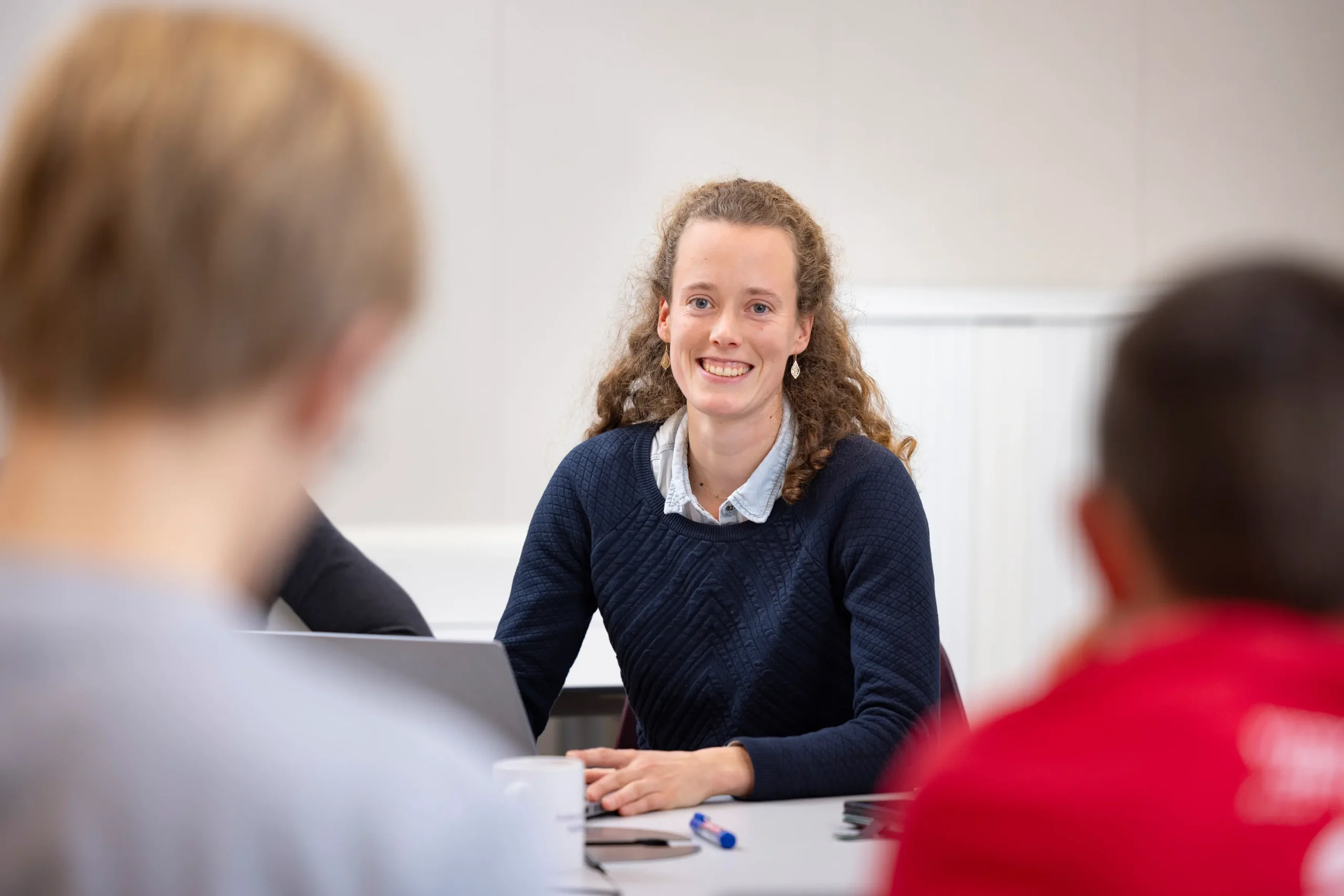
Anna-Louise Nijdam
© Studio Oostrum

